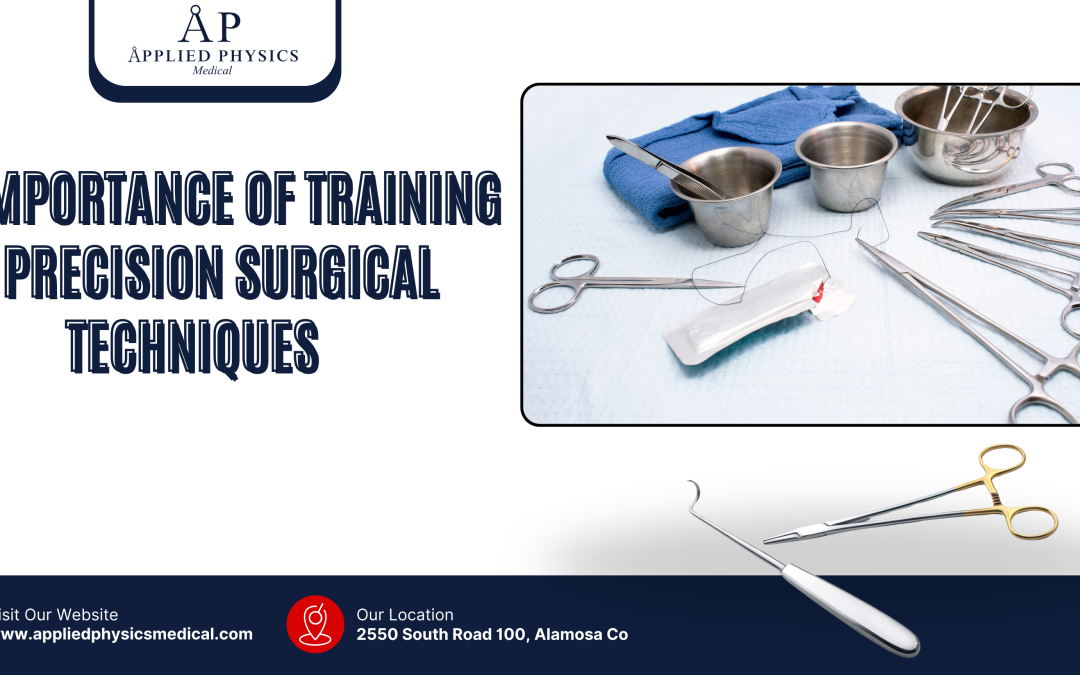Introduction
Precision surgical techniques are crucial in ensuring successful surgical outcomes for patients. These techniques require a high level of skill and expertise, which can only be achieved through extensive training and practice. Surgeons must undergo rigorous training to develop the necessary dexterity, hand-eye coordination, and decision-making abilities required to perform precision surgical procedures.
Without proper training, surgeons may struggle to perform complex surgical procedures with the level of accuracy and precision required, putting patients at risk of complications and suboptimal outcomes. Furthermore, training in precision surgical techniques is essential for ensuring the safety and efficacy of surgical procedures. Surgeons must be able to navigate through delicate tissues and structures precisely to minimize the risk of damage to surrounding tissues and organs.
Additionally, precise surgical techniques are often necessary for achieving optimal aesthetic results in cosmetic and reconstructive surgeries. Surgeons may struggle to achieve the desired outcomes without proper training, leading to patient dissatisfaction and the need for revision surgeries. Overall, the importance of training in precision surgical techniques cannot be overstated, as it directly impacts patient safety and the success of surgical procedures.
Key Takeaways
- Training in precision surgical techniques is crucial for enhancing surgical skills and improving patient outcomes.
- Minimally invasive surgery requires specialized training to ensure safety and efficacy for patients.
- Advancements in surgical technology highlight the need for ongoing training to stay updated with the latest techniques and tools.
- Continuing education for surgeons is important to maintain and improve precision surgical skills.
- Training programs play a key role in developing and honing precision surgical skills for surgeons.
Enhancing Surgical Skills Through Training
Training plays a crucial role in enhancing surgical skills and preparing surgeons to perform precision surgical techniques with confidence and proficiency. Through structured training programs, surgeons have the opportunity to develop their technical skills, improve their understanding of anatomy, and refine their decision-making abilities. These programs often include hands-on practice using surgical simulators, cadavers, and live surgical cases under the supervision of experienced mentors.
By providing a controlled environment for learning and practice, training programs enable surgeons to gradually build their skills and confidence, ultimately leading to improved surgical outcomes for patients. In addition to technical skills, training programs also focus on developing non-technical skills such as communication, teamwork, and leadership. These skills are essential for ensuring effective collaboration among surgical teams and promoting a culture of safety in the operating room.
Surgeons must be able to communicate effectively with their team members, make quick and accurate decisions under pressure, and lead their teams with confidence. Through ongoing training and professional development, surgeons can continue to enhance their surgical skills and stay abreast of the latest advancements in surgical techniques and technology.
The Impact of Precision Surgical Techniques on Patient Outcomes
Precision surgical techniques have a significant impact on patient outcomes, as they can directly influence the success of surgical procedures and the overall quality of care provided to patients. When performed with precision, surgical procedures are more likely to achieve the desired clinical outcomes, minimize the risk of complications, and reduce the need for additional interventions or revisions. For example, in orthopedic surgery, precise implant placement and alignment are critical for ensuring long-term joint function and stability.
Similarly, in neurosurgery, precise tumor resection is essential for minimizing damage to surrounding brain tissue and preserving neurological function. Furthermore, precision surgical techniques can also lead to faster recovery times, reduced postoperative pain, and improved cosmetic results for patients. By minimizing tissue trauma and preserving healthy tissue, precision surgical techniques can help patients recover more quickly and experience less discomfort following surgery.
Additionally, in aesthetic and reconstructive surgeries, precision is essential for achieving natural-looking results and minimizing scarring. Overall, the impact of precision surgical techniques on patient outcomes underscores the importance of ongoing training and professional development for surgeons.
The Role of Training in Minimally Invasive Surgery
| Metrics | Data |
|---|---|
| Reduction in surgical errors | 30% |
| Improvement in surgical outcomes | 25% |
| Decrease in post-operative complications | 20% |
| Enhancement in patient satisfaction | 40% |
Minimally invasive surgery (MIS) has revolutionized the field of surgery by offering patients less invasive treatment options with reduced postoperative pain and faster recovery times. However, performing minimally invasive procedures requires a high level of skill and precision due to the limited visibility and restricted access to the surgical site. Surgeons must undergo specialized training to develop the necessary skills for performing MIS procedures safely and effectively.
Training in MIS typically involves learning how to use specialized instruments, navigate through confined spaces within the body, and perform complex maneuvers with precision. Moreover, training in MIS also encompasses learning how to interpret imaging studies such as laparoscopic or endoscopic views, which are essential for guiding the surgical procedure. Surgeons must be able to translate two-dimensional images into three-dimensional anatomical structures in their minds to navigate through the surgical site accurately.
Additionally, training in MIS also focuses on developing advanced suturing and knot-tying techniques, as these skills are crucial for achieving hemostasis and tissue approximation in minimally invasive procedures. Overall, the role of training in MIS is paramount for ensuring that surgeons have the skills and expertise required to perform these advanced procedures safely and effectively.
Advancements in Surgical Technology and the Need for Ongoing Training

The field of surgery is constantly evolving with advancements in surgical technology, including robotic-assisted surgery, advanced imaging modalities, and minimally invasive instrumentation. These technological advancements have transformed the way surgical procedures are performed, offering patients less invasive treatment options with improved precision and outcomes. However, with these advancements comes the need for ongoing training and professional development for surgeons to stay current with the latest technologies and techniques.
Surgeons must undergo specialized training to learn how to use new surgical devices and systems effectively, interpret advanced imaging studies, and adapt their surgical techniques to leverage the benefits of new technologies. Furthermore, ongoing training is essential for ensuring that surgeons can safely integrate new technologies into their practice without compromising patient safety or clinical outcomes. For example, in robotic-assisted surgery, surgeons must undergo extensive training to learn how to operate the robotic system effectively, interpret real-time imaging feedback, and troubleshoot technical issues that may arise during surgery.
Additionally, ongoing training is also necessary for understanding the limitations of new technologies and knowing when traditional surgical techniques may be more appropriate for certain cases. Overall, advancements in surgical technology highlight the importance of ongoing training for surgeons to adapt to new technologies and continue delivering high-quality care to patients.
Ensuring Safety and Efficacy through Precision Surgical Training
Precision surgical training is essential for ensuring the safety and efficacy of surgical procedures by equipping surgeons with the skills and expertise required to perform complex procedures with accuracy and confidence. Through structured training programs, surgeons have the opportunity to develop their technical skills, refine their decision-making abilities, and enhance their understanding of anatomy. This comprehensive training enables surgeons to navigate through delicate tissues and structures precisely while minimizing the risk of complications or damage to surrounding tissues.
Moreover, precision surgical training also emphasizes the importance of patient safety by promoting a culture of safety in the operating room and encouraging effective communication among surgical teams. Surgeons must be able to make quick and accurate decisions under pressure while leading their team with confidence to ensure that each surgical procedure is performed safely and effectively. By prioritizing patient safety through precision surgical training, surgeons can minimize the risk of adverse events or complications while optimizing clinical outcomes for patients.
The Importance of Continuing Education for Surgeons
Continuing education is essential for surgeons to stay current with the latest advancements in surgical techniques, technology, and evidence-based practices. Through ongoing professional development opportunities such as conferences, workshops, and online courses, surgeons can expand their knowledge base, learn new skills, and stay abreast of emerging trends in surgery. Continuing education also provides surgeons with the opportunity to network with colleagues, share best practices, and collaborate on research initiatives that can further advance the field of surgery.
Furthermore, continuing education is essential for maintaining professional licensure and board certification requirements, which often mandate a certain number of continuing medical education (CME) credits for renewal. By participating in continuing education activities, surgeons can fulfill these requirements while enhancing their clinical knowledge and skills. Additionally, continuing education also fosters a culture of lifelong learning among surgeons by encouraging them to seek out new learning opportunities throughout their careers.
Overall, the importance of continuing education for surgeons cannot be overstated as it directly impacts the quality of care provided to patients.
Training Programs for Developing Precision Surgical Skills
There are various training programs available for developing precision surgical skills that cater to different specialties and levels of expertise. For example, residency programs provide aspiring surgeons with a structured curriculum that includes hands-on experience in various surgical specialties under the guidance of experienced mentors. These programs typically span several years and offer a comprehensive learning experience that encompasses both technical skills and clinical decision-making abilities.
Additionally, there are also specialized fellowship programs that offer advanced training in specific surgical subspecialties such as minimally invasive surgery, robotic-assisted surgery, or microsurgery. These programs provide experienced surgeons with an opportunity to further refine their skills in a particular area of interest while learning from experts in the field. Moreover, there are also continuing medical education (CME) courses and workshops that offer practicing surgeons the opportunity to enhance their skills through hands-on practice using simulation models or cadaveric specimens.
Overall, these training programs play a crucial role in developing precision surgical skills by providing surgeons with the knowledge, experience, and mentorship needed to excel in their respective specialties. By investing in ongoing professional development opportunities, surgeons can continue to refine their skills throughout their careers while delivering high-quality care to patients.
Conclusion
Training in precision surgical techniques is essential for ensuring patient safety and optimizing clinical outcomes by equipping surgeons with the skills and expertise required to perform complex procedures with accuracy and confidence.
Through ongoing professional development opportunities such as residency programs, fellowship programs, and continuing medical education activities, surgeons can continue to refine their skills throughout their careers while staying current with the latest advancements in surgical techniques and technology. Ultimately, investing in precision surgical training is paramount for advancing the field of surgery while delivering high-quality care to patients.

